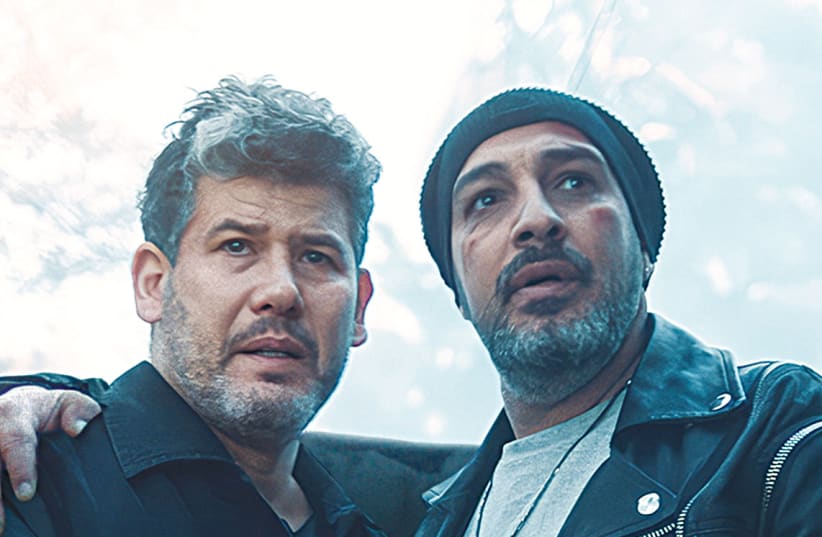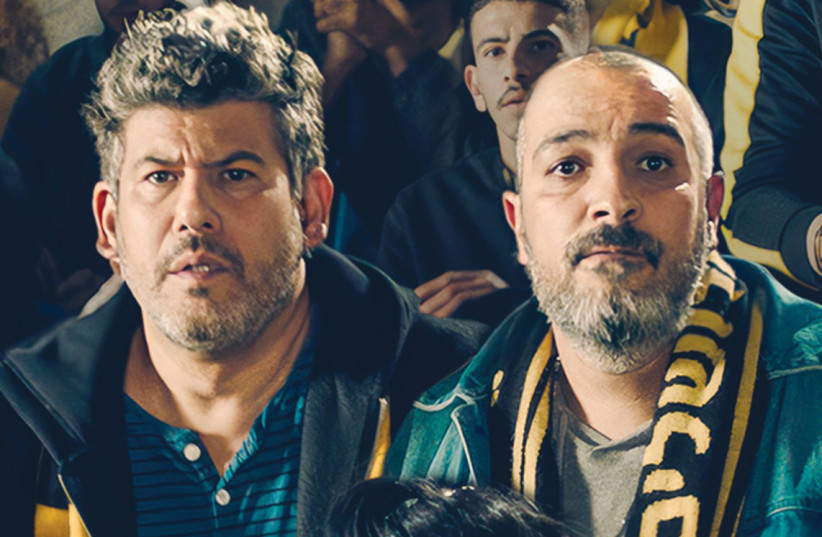Hanan Savyon and Guy Amir, the duo behind the TV series Asfur and the megahit Israeli movies Maktub and Forgiveness, are back on the small screen with Bros, Netflix’s first original Hebrew-language series, which recycles the Jerusalemite schlubby bromance shtick that has worked for them all these years.
If you liked their earlier work, you’ll have fun with this, and if you didn’t, well, you’re probably not their target audience anyway. For once, there are English subtitles available, which will make it easier for many English-speakers in Israel to give it a try.
It won’t shock anyone to hear that they play two friends who run a bar in the Mahaneh Yehuda market called Pin-Younis, with Savyon as the hard-partying Pini, whose wife can’t get pregnant (which a doctor suggests is a problem caused by Pini’s drug use), and Amir as Niso, his BFF and business partner, whose girlfriend, Rotem (Yael Sztulman), works at the bar.
The main plot is about how they head to Krakow to support their favorite soccer team – Beitar Jerusalem, as you might have guessed – as it competes against a Polish team. Subplots include a possible cancer diagnosis, Niso’s problems with Rotem, and a group of Tel Aviv hipsters who plan to open a rival establishment and then try to buy their bar.
Their Poland adventure takes up several episodes and allows them to delve a bit into the little-known history of how Mizrahim were victims in the Holocaust.
The Poland episodes also feature all kinds of action, including when they get chased by a group of neo-Nazis and even more dire predicaments. Like a lot of Israeli comedies, the series mixes sentimental and melodramatic storylines with the slapstick.
One thought that occurred to me watching it is that while most Beitar fans are just fans, there is a racist element to the team’s fan base that you wouldn’t guess at from its portrayal here. The series doesn’t make it clear that the characters distance themselves from the kinds of fans who have actually unfurled “Forever Pure” banners at the team’s matches – “Forever Pure” is the title of an excellent documentary about these fans – to show their opposition to the team hiring Arab players. These fans have resorted to violence to show their opposition to having Arabs and Muslims of all nationalities join the team.
But the heart of the series is Pini and Niso’s friendship, and Savyon and Amir, who have been working together for decades, really project the closeness of longtime friends and, like so many comic actors, rise to the occasion when there is an emotional moment. Their self-deprecating likability lifts this series above its often formulaic script, and if you stick with it, it will be because you enjoy spending time in their company.
What else is on Israeli TV?
IT’S GOOD news for fans of vintage American sitcoms that Yes has just started a new channel called Classic Comedies, which is available on Channel 29. It runs around the clock, and it offers comedy series from the ’70s to the ’90s. It features All in the Family, which many consider the greatest sitcom of all time, which was about the unrepentant racist Archie Bunker.
This series was created by television great Norman Lear, and was more or less the first time that a network television comedy dealt with political issues for laughs, but with a serious agenda. Lear was a liberal, and while the pugnacious hero, Bunker, charmed some, his convictions were proved wrong in episode after episode, although the series also made fun of his liberal son-in-law (played by Rob Reiner, the son of Carl Reiner, who is now a movie director) and his daughter (Sally Struthers).
Other sitcoms on the channel include Mad About You, with Paul Reiser and Helen Hunt (who went on to win a Best Actress Oscar for As Good As It Gets), Cheers (considered one of the best ensemble casts of all times), Happy Days (the Fonz!), Who’s the Boss? and The Love Boat.
If Yes programmers are reading this, I’d like to request that they add The Mary Tyler Moore Show and Taxi, two series created by James L. Brooks that I would be very happy to see at 2 a.m. when I can’t sleep.
ONE OF the big issues in the Hollywood writers strike was the use of AI to write screenplays, because the Hollywood scribes feared they would be replaced. But when you watch a lot of the rom-coms and light entertainment on Netflix and other platforms these days, it’s hard to believe that they weren’t written by robots, and not especially well-programmed robots.
That doesn’t mean you won’t enjoy aspects of them; the casts and locations are always great-looking. But to say that there are no surprises would be an understatement.
A case in point is the new Spanish movie on Netflix, Love, Divided. It’s about a nerdy but gorgeous app designer who works out of his apartment, which shares a paper-thin wall with the apartment that a recently dumped, awkward but gorgeous pianist moves into. He has a deadline to get the app ready and must work all the time, while she is practicing for a special audition.
If you’ve seen a movie or two, you could easily write a script right now that would be almost identical to the actual film.
LOOKING FOR something a little more interesting, I found I’ll See You in My Dreams, a movie that recently joined the Netflix lineup and which stars Blythe Danner (who is probably best known these days for being Gwyneth Paltrow’s mother, but who has had a very interesting career of her own) as Carol, a lonely widow who steps back into the dating pool after many years alone. While it might sound like a typical rom-com, it’s much more thoughtful and even a bit downbeat.
Carol, a retired singer and teacher and the mother of an adult daughter who lives far away, wakes up every morning, waters her plants, exercises, sees her girlfriends (a great group played by Rhea Perlman, Mary Kay Place, and June Squibb), and plays golf, but she feels something is missing in her life; and after her beloved dog dies, she begins dating.
Sam Elliott, who played the wise old cowboy in The Big Lebowski, is her love interest, and his character is similarly adrift.
But the story isn’t all straight lines and big laughs, ending with a clinch. One element that sets it apart is a storyline where she befriends her pool cleaner, a young man who aspires to write songs and feels stuck, and to whom she can open up in a way she can’t with her old friends.
The pool cleaner is played by Martin Starr, whom you may know as Gilfoyle, the Satan-worshiping programmer in Silicon Valley. While I loved him in that series, I actually didn’t recognize him here, and without his strange Gilfoyle hairstyle, he is a handsome leading man type, with an edge.
While I watched this movie, I started out envying the characters because they were living their lives in a world that was so peaceful, without war or terrorism or the thousands of other things that make life in Israel challenging. But by the end I realized that, to quote a line from the Norwegian movie 1001 Grams, “Life’s heaviest burden is having nothing to carry.”
MUCH IS coming up soon in May, including a number of movies and series to mark Holocaust Remembrance Day, notably the series The Tattooist of Auschwitz, which stars Harvey Keitel in an adaptation of the book of the same name.
There will be much more programming devoted to marking this day, including documentaries, series, and feature films, as well as movies devoted to Remembrance Day for the Fallen of Israel’s Wars and Independence Day, which will be filled with deeper sorrow this year, since the losses of October 7 and the subsequent war.

